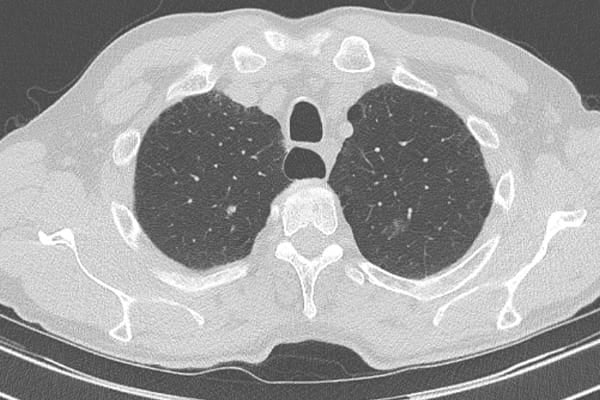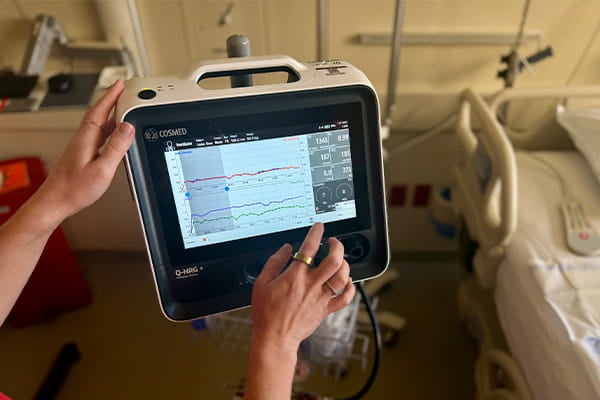Ascension Seton Williamson Sleep Center
Sleep specialists at Ascension Seton Williamson Sleep Center in Round Rock, Texas, diagnose, treat and manage sleep disorders, including sleep apnea.
Specialty care for sleep disorders
Understanding how to improve the quality of your sleep is important for your physical and emotional health. Sleep medicine doctors at Ascension Seton Williamson Sleep Center in Round Rock, Texas, listen to understand you and your health concerns. Then, we work with you to create a care plan that’s right for you. Our board-certified pulmonologists and sleep medicine specialists and registered sleep technologists specialize in diagnosing, treating and managing sleep disorders in adults and children age 10 and older (with referrals through the Dell Children's Medical Center Sleep Clinic). We have the expertise to perform diagnostic tests to better understand how your breathing and sleep routine affects your heart, lungs and brain. Common sleep conditions include:
- Central sleep apnea
- Insomnia (difficulty sleeping)
- Narcolepsy (difficulty staying awake)
- Obstructive sleep apnea
- Parasomnias, such as nightmares or sleepwalking
- Periodic limb movement disorder (cramping or jerking of the legs)
- Restless leg syndrome
- Snoring
Sleep tests for different types of sleep disorders
When chronic snoring, fatigue and daytime sleepiness affect your daily life, ask your doctor if a sleep study is right for you. Our sleep lab provides a wide range of sleep evaluations and testing, including:
- All-night sleep study
- Continuous positive airway pressure (CPAP) titration
- Multiple sleep latency testing
- Neurodiagnostic tests and epilepsy monitoring
- Polysomnography
- Split study, half diagnostic and half with the CPAP device
- Wakefulness testing
Home-based sleep apnea study
For some patients, an at-home sleep study may be an option. We provide the sleep study device and instructions. Your care team takes the time to answer your questions and explain the test to you. Once you complete the sleep study, return the device to our Sleep Center to be analyzed. A diagnostic report is then sent to your doctor.
Sleep disorder care plans
Your doctor provides treatment options to help you manage your symptoms and improve your sleep hygiene. Sleep disorder treatments also help support your brain and heart health by improving the delivery of oxygen throughout your body. Sleep disorder treatments may include:
- Cognitive behavior therapy
- Continuous positive airway pressure (CPAP) device for sleep apnea
- Insomnia treatment using cognitive behavior therapy
- Lifestyle and dietary changes
- Medically supervised weight loss or bariatric surgery
- Medication management
- Relaxation skills
- Sleep apnea implant device
Your care team connects the dots for your care – from helping you schedule a sleep study to referring you to other specialists, if needed.
Multidisciplinary approach to care
When you choose a sleep specialist at Ascension Seton, you get a doctor who is part of a national team of specialists sharing best practices in sleep medicine and research on how sleep disorders can affect your heart, lungs and brain. Our doctors bring a multispecialty approach to sleep disorder care for:
- Brain and nervous systems conditions (neurologists)
- Breathing conditions (respiratory therapists)
- Dental conditions (dentists and maxillofacial surgeons)
- Ear, nose and throat conditions (ear, nose and throat doctors)
- Lung and breathing conditions (pulmonologists)
- Mental health conditions (psychiatrists and psychologists)
- Pediatric sleep disorders (pediatric sleep specialists)
Sleep disorders and your overall health
Sleep helps your body renew your mental and physical health. The most common symptoms of a sleep disorder include excessive daytime sleepiness, chronic snoring, problems getting to sleep, restless legs, sleep walking or other disruptions during sleep. Talk to your doctor about any symptoms you are experiencing. If left untreated, a sleep disorder increase your risk for:
- Depression
- Diabetes
- Heart attack
- Heart rhythm disorders, including atrial fibrillation
- High blood pressure
- Obesity
- Stroke



